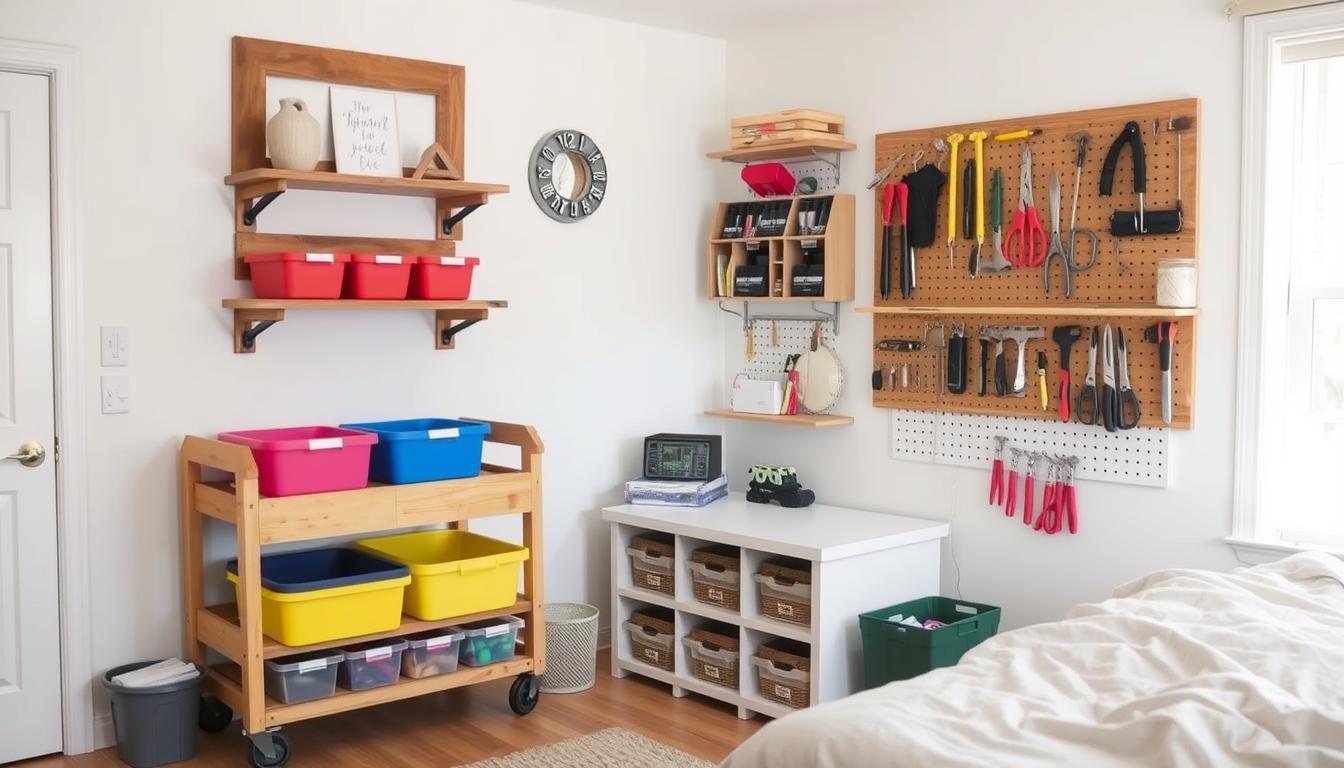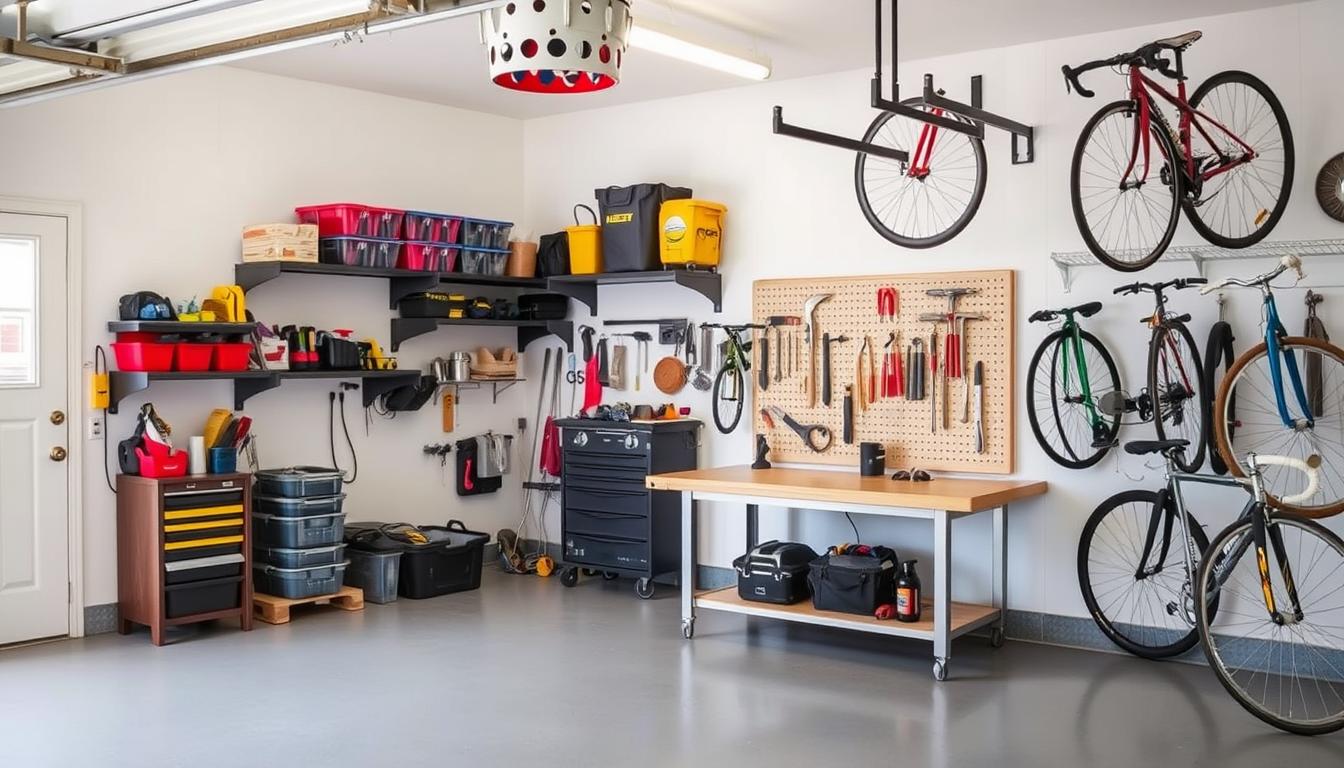A storage loft is a smart way to use the overhead space in garages, attics, or other home areas. It offers a practical spot for items you don’t use often, keeping them organized and out of sight. By creating a storage loft, you can optimize your overhead space and maintain order. A well-thought-out storage loft maximizes your space, providing a handy and accessible storage option.
Utilizing a storage loft frees up floor space and minimizes clutter, making it easier to navigate and locate items. It’s perfect for storing seasonal decorations, out-of-season clothes, and other rarely used items. This keeps them safe and out of the way, enhancing your living space’s organization and peace. It can also boost your home’s value by adding extra storage.
Adding a storage loft to your home makes it more functional and efficient. It can be tailored to meet your specific needs, offering a flexible and practical solution for various items. Whether you aim to clear floor space, cut down on clutter, or enhance your home’s organization, a storage loft is a compelling choice. It’s ideal for making the most of your overhead space with a well-designed platform.
Key Takeaways
- A storage loft provides a practical solution for storing items that you don’t frequently use.
- Building a storage loft can help you maximize your overhead space and keep your belongings organized.
- A well-designed storage loft can help you create a more organized and peaceful living space.
- A storage loft can be customized to fit your specific needs, providing a versatile and practical solution for storing a variety of items.
- Using a storage loft can help you free up floor space and reduce clutter.
- A storage loft can increase the value of your home by providing additional storage space.
Understanding Storage Loft Benefits
When exploring storage solutions for your home, the advantages of a storage loft are crucial. A garage loft or elevated storage area offers numerous benefits, such as optimized space and potential return on investment. By utilizing the often-wasted space above your garage or other areas, you can create a functional and efficient storage solution.
The benefits of a storage loft are multifaceted. For instance, it can help maximize your home’s storage capacity while keeping your living areas clutter-free. This, in turn, can increase your home’s value and appeal to potential buyers if you decide to sell in the future. A well-designed storage loft can also serve as a versatile space, suitable for various purposes, such as a home office, hobby room, or additional storage for seasonal decorations.
Space Optimization Advantages
A storage loft can be a game-changer for homeowners looking to optimize their space. By installing a garage loft or elevated storage area, you can:
- Utilize previously unused space
- Keep your living areas organized and clutter-free
- Increase your home’s storage capacity
Return on Investment
A storage loft can also provide a significant return on investment. According to real estate experts, a well-designed storage loft can recoup up to 80% of its cost at resale. This makes it a worthwhile investment for homeowners looking to add value to their property.
Versatility in Different Spaces
A storage loft can be adapted to fit various spaces, including garages, attics, and basements. This versatility makes it an ideal solution for homeowners with unique storage needs. Whether you’re looking to store seasonal decorations, out-of-season clothing, or hobby equipment, a storage loft can provide a convenient and accessible storage solution.
| Storage Loft Type | Benefits |
|---|---|
| Garage Loft | Optimized storage, increased home value |
| Elevated Storage | Versatile, accessible storage solution |
Essential Planning Considerations
When diving into loft construction, planning is paramount for success and safety. Before starting your storage loft project, several key factors must be considered. These include evaluating the available space, determining the loft’s purpose, and ensuring it can handle the intended weight. Proper planning prevents costly errors and ensures your loft meets your needs and expectations.
Here are the essential planning steps for your loft construction project:
- Assess the available space: Measure your attic or ceiling area precisely to determine the loft’s maximum size.
- Determine the purpose of the loft: Will it be for storage, a home office, or a recreational area? This guides the design and features of your loft.
- Ensure structural support: Calculate the ceiling’s weight capacity to ensure it can bear the loft’s weight, including materials, furniture, and stored items.
By meticulously considering these factors and planning your loft construction, you can create a safe, functional, and aesthetically pleasing space. This space will meet your needs and increase your home’s value. Always adhere to local building codes and regulations. If unsure about any part of the process, consult a professional.
| Planning Consideration | Importance |
|---|---|
| Assessing available space | High |
| Determining the purpose of the loft | Medium |
| Ensuring structural support | High |
Calculating Weight Capacity and Support Requirements
When constructing a storage loft, determining the weight capacity and support needs is crucial. The weight a storage platform can hold depends on its materials and design. You must consider the materials’ weight, platform size, and intended use to calculate this.
A platform with a high weight capacity can support heavier items, perfect for storing bulky objects. Yet, it’s vital to ensure the platform’s design can handle the weight. Adequate structural support, such as beams, joists, and trusses, is necessary to distribute the load evenly.
Load-Bearing Calculations
Load-bearing calculations determine a platform’s maximum weight capacity. This involves considering the materials’ weight, platform size, and intended use. Consulting a professional is essential to ensure accurate calculations and proper design for the intended weight.
Structural Support Methods
Structural support methods are key to a platform’s safety and functionality. Beams, joists, and trusses are common methods to evenly distribute weight. The choice of method depends on the loft’s design, weight capacity, and intended use.
Safety Margins and Standards
Adhering to safety margins and standards is critical for a platform’s safety. It’s important to follow local building codes and regulations when constructing a storage loft. A professional can guide you on the necessary safety measures for your project.
By adhering to these guidelines, you can create a safe and functional storage loft. This ensures your items are stored reliably, meeting your needs effectively.
| Material | Weight Capacity | Structural Support Method |
|---|---|---|
| Wood | 500 lbs | Beams and Joists |
| Steel | 1000 lbs | Trusses and Beams |
| Aluminum | 750 lbs | Joists and Beams |
Choosing the Right Materials for Your Storage Loft
Building a storage loft requires careful material selection for durability, safety, and aesthetics. The choice of storage loft materials greatly influences the outcome. With a wide range of options, from wooden beams to metal frames, understanding each material’s characteristics is key. This knowledge helps you make a choice that aligns with your needs and budget.
Consider the weight capacity and support needs of your storage loft. Materials vary in strength and durability. For instance, wooden beams are strong and visually appealing but might need extra support. Metal frames, on the other hand, are durable and can handle heavy loads but are often pricier than wood.
Some common storage loft materials include:
- Wooden beams and planks
- Metal frames and brackets
- Plywood and oriented strand board (OSB)
- Steel and aluminum
Assess your storage loft’s specific needs and weigh the advantages and disadvantages of each material. This approach ensures a safe, functional space that fulfills your storage requirements. Remember to factor in maintenance, durability, and cost in your decision-making process.
Step-by-Step Storage Loft Construction Guide
Creating a detailed loft construction guide is vital for a successful project. First, prepare the foundation, ensuring a solid base for the loft. This means clearing the area, checking for any obstructions, and verifying the floor’s load-bearing capacity.
Then, the frame assembly is a crucial step. It involves precise measurement and cutting of the frame components. After, assemble them using the right fasteners. The frame must be level, plumb, and securely attached to the floor.
Key Construction Steps
- Foundation preparation: Clear the area, check for obstructions, and verify load-bearing capacity
- Frame assembly: Measure, cut, and assemble frame components
- Platform installation: Install the loft platform, ensuring it is level and secure
- Safety features integration: Install safety features, such as railings and ladders
By adhering to a thorough loft construction guide, homeowners can build a functional and safe storage loft. Safety should always be a top priority during construction.
Before starting, always check local building codes and regulations. With careful planning and execution, a storage loft can offer valuable space for storage and organization.
Access Solutions and Ladder Options
Ensuring safety and convenience in storage loft access is paramount. A well-thought-out access solution can significantly enhance the usability and upkeep of your storage loft. Various options are available, including folding ladders, sliding ladders, and permanent staircases.
Popular choices for accessing storage lofts include:
- Folding ladders: space-saving and easy to install
- Sliding ladders: provide easy access and can be locked in place for safety
- Permanent staircases: a more permanent solution that can be customized to fit your loft design
When selecting an access solution, consider the size and weight capacity of your storage loft. Also, think about your personal preferences and needs. It’s crucial to ensure that your chosen access solution complies with local building codes and safety standards.
A well-designed access solution ensures safe and convenient storage loft access. This makes it effortless to store and retrieve items from your loft. By carefully evaluating your options and selecting the most suitable access solution, you can create a functional and efficient storage space.
Investing in a high-quality access solution guarantees that your storage loft is safe, convenient, and easy to use. Whether opting for a folding ladder, sliding ladder, or permanent staircase, prioritize safety and convenience in your design.
| Access Solution | Benefits | Considerations |
|---|---|---|
| Folding Ladder | Space-saving, easy to install | Weight capacity, safety features |
| Sliding Ladder | Easy access, can be locked in place | Size, material, safety standards |
| Permanent Staircase | Customizable, permanent solution | Cost, installation requirements, local building codes |
Maximizing Your Storage Loft Space
To maximize your storage loft, it’s crucial to organize the space efficiently. A well-planned system helps categorize items, making them easier to locate. This approach ensures that everything has its place, enhancing accessibility.
When organizing your storage loft, several factors come into play. First, assess the available space and plan how to use it effectively. Installing shelves, hooks, and other solutions tailored to your needs is key. Labels and signs can also help identify stored items, streamlining your search process.
Here are some tips for maximizing your storage loft space:
- Use vertical space by installing shelves and hooks that go up to the ceiling.
- Invest in storage bins and containers to keep items organized and out of sight.
- Consider implementing a seasonal rotation system, where you store items that are only used during certain times of the year.
By adopting these strategies and a well-organized system, you can optimize your storage loft. This ensures your belongings are not only organized but also easily accessible.
| Storage Category | Description |
|---|---|
| Seasonal Decorations | Items used only during certain times of the year, such as Christmas decorations or Halloween costumes. |
| Infrequently Used Items | Items that are not used regularly, such as out-of-season clothing or special occasion dishes. |
| Archival Storage | Important documents or items that need to be kept for a long time, such as tax records or family photos. |
Safety Features and Maintenance Requirements
Ensuring storage loft safety is paramount. It’s essential for the longevity of your storage loft and your safety. Regular maintenance is crucial to avoid accidents and damage to your items.
To ensure storage loft safety, consider these key features:
- Sturdy flooring and support beams
- Secure ladder or staircase access
- Adequate lighting and ventilation
- Fire-resistant materials and emergency exit plans
Regular maintenance tasks include inspecting the structure for damage, cleaning to prevent dust and debris buildup, and ensuring all safety features are functioning. By prioritizing storage loft safety and maintenance, you can enjoy a secure and functional storage space for years.
A well-maintained storage loft not only protects your belongings but also offers peace of mind. By adhering to these guidelines and committing to regular maintenance, you can create a safe and reliable storage space. This enhances your overall quality of life.
Conclusion: Transform Your Space with a Practical Storage Solution
A storage loft transforms overhead space into a functional, organized area. This guide has provided essential tips and guidelines. You can now create a safe, durable, and adaptable storage loft that meets your needs. It will enhance your home’s functionality and value.
A well-designed storage loft optimizes space and boosts your home’s value. It’s perfect for freeing up floor space, storing seasonal items, or creating an organizational hub. This solution offers flexibility and convenience, streamlining your living space.
When starting your storage loft project, focus on safety, structure, and customization. Proper planning, materials, and detail ensure a lasting solution. Your storage loft will become a valuable addition, turning unused space into accessible storage.






